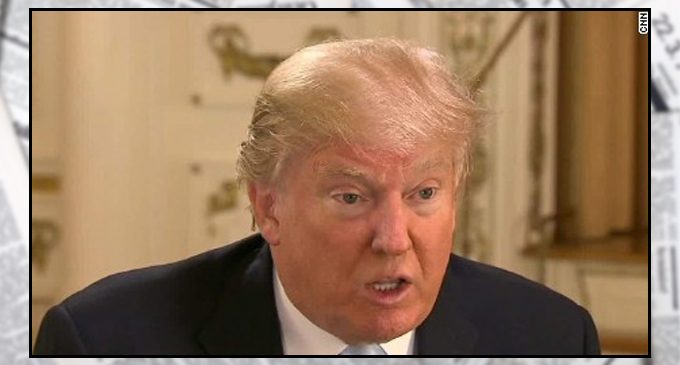Trump HBCU statement confuses

BY CASH MICHAELS
FOR THE CHRONICLE
Is President Donald Trump standing by his stated earlier commitment to support historically black colleges and universities (HBCUs), or is he backing off, using some oblique constitutional reason not to do so?
Last Friday afternoon, the Trump White House issued a statement upon signing H.R. 244, the Consolidated Appropriations Act 2017, which was recently passed by Congress to fund the federal government by $1.1 trillion through September 2017.
What was notable about the law was that even Democrats, like U.S. Rep. Alma Adams (D-NC-12), were pleased with it.
“This is a clean bipartisan budget that’s good for the 12th District,” she said in a May 3 statement. “Students across the 12th District will now have access to year-around Pell Grants, increasing access to higher education and opportunity.”
Rep. Adams concluded, “This budget is a reflection of what Congress can accomplish when we work together.”
But in Trump’s May 5 signing statement on the law, the Republican president delineated which provisions of the bill “would, in certain circumstances, unconstitutionally limit my ability” as commander-in-chief.
Toward the end of Trump’s statement, he continued, “My Administration shall treat provisions that allocate benefits on the basis of race, ethnicity, and gender (e.g., Division B …Historically Black College and University Capital Financing Program Account) in a manner consistent with the requirement to afford equal protection of the laws under the Due Process Clause of the Constitution’s Fifth Amendment.”
According to The Hill, a Washington, D.C. online newspaper, the 25-year-old “financing program lets the Education Department allot federally-backed loans to historically black colleges and universities to help them fund construction on their campuses,” in this case, $20 million in federal loan subsidies in fiscal year 2017.
In North Carolina, Bennett College for Women in Greensboro knows the value of that program firsthand.
“Bennett College has benefitted greatly from the HBCU Capital Financing Program,” said LeRoy Summers Jr., interim vice president for administration and finance. “In 2009, the College borrowed program funds to construct a new Honors Residence Hall, a Global Learning Center and an Intergenerational Children’s Center. Funds were also borrowed to refinance an existing loan from the Department of Education. The interest rates on these loans were lower than rates offered by financial institutions, thus saving the College money.”
But POLITICO, another online D.C.-based newspaper, reported, “where the bill conflicts with the White House’s interpretation of the president’s powers under the Constitution, he will go with the Constitution.”
In other words, because the program was exclusive to HBCUs, Trump was hinting that he might not approve of funding it.
It didn’t take long for Trump’s critics to interpret his statement as a betrayal of his February 28 executive order that HBCUs will be “an absolute priority for this White House.”
Trump made that declaration during a meeting with over 80 HBCU presidents and chancellors then in the Oval Office for a photo op. He promised no increased funding at the time, but Republicans in Congress ensured that HBCUs would see considerable support. Democrats, on the other hand, were weary.
After Trump’s May 5 contradictory signing statement, his critics pounced.
News stories suggested that the president was “hinting that financing for HBCUs may be unconstitutional.”
Rep. Adams, co-chair of the Bi-partisan HBCU Caucus in Congress, was one of several black congresspeople to express outrage. “I am surprised and troubled by President Trump’s signing statement on the FY17 omnibus, which specifically singled out our Historically Black Colleges and Universities,” Adams continued. “Any action taken to weaken the HBCU Capital Financing Program would undermine their financial stability, harming both students and alumni alike. The president needs to keep his word and prioritize supporting these important institutions. The economic prospects of hundreds of thousands of Americans depends on it.”
At Bennett College in Greensboro, the concern was real. “It is imperative that the Trump administration recognizes the program’s value to our institutions and the community at large and leaves it intact,” Summers said. “Aside from the financial benefits to HBCUs, doing so is also important for maintaining good relations between HBCUs and the Trump administration. In late February, Bennett College Interim President Dr. Phyllis Worthy Dawkins and other HBCU presidents and chancellors met in good faith with Trump and his administrators. If funding for the HBCU Capital Financing Program is cut, that would detract from the progress that was made during those meetings.”
Other HBCU leaders, like Chancellor Elwood Robinson of Winston-Salem State University, held their fire, choosing instead to remind the White House of what HBCU’s bring to the table.
“While Winston-Salem State University does not currently have a project funded through the program President Trump was addressing, we believe that historically black colleges and universities play a critical role in the nation’s higher education landscape,” Robinson said in a statement. “Our 25,000-plus alumni demonstrate the incredible outcomes and the enormous economic impact we have on the region and the nation. We continue to strive to ensure that policymakers are aware of the value of HBCUs – and the historic underfunding of our institutions – and support us at both the state and federal level.”
Still others in the HBCU community, like Cheryl Smith, senior vice president of public policy and government affairs for the United Negro College Fund, said she was “puzzled by this provision and [was] seeking clarification from the White House as to its meaning.”
Even the spokesman for Republican U.S. Rep. Mark Walker of Greensboro (R-NC-6) was confused, especially since Walker was a GOP leader pushing for more funding for HBCUs in Congress.
“We saw this over the weekend and have some questions,” said Jack Minor, Rep. Walker’s communications director. “We are seeking clarification from the administration on the signing statement.”
The Thurgood Marshall College Fund, which also advocates for more HBCU funding, also weighed in.
“We have shared with the White House our assertion that the HBCU program is not at all a race-based government effort and therefore doesn’t raise any equal protection or due process concerns because participation in the program is limited to HBCUs,” the TMCF said in a weekend statement. “HBCUs serve some of the most diverse populations in this nation and three TMCF member-schools enroll more white students than black students.”
With criticism mount-ing, the Trump administration finally decided Sunday that a clarification was in order.
“The statement that accompanied my signing of the Consolidated Appropriations Act, 2017, sets forth my intention to spend the funds it appropriates, including the funds for Historically Black Colleges and Universities (HBCUs), consistently with my responsibilities under the Constitution,” President Trump said. “It does not affect my unwavering support for HBCUs and their critical education-al missions.”
“In a few days, my Secretary of Education Betsy DeVos will give the commencement address at Bethune-Cookman University, a school founded by the great Mary McCleod Bethune and committed to leadership and service. Secretary DeVos chose an HBCU as the venue for her first commencement address to demonstrate my administration’s dedication to these great institutions of higher learning.”
The president continued, “I look forward to selecting an Executive Director and Board for my HBCU initiative and continuing this important work with HBCUs throughout the nation.”
But even with that clarification, Democrats were not convinced that when it comes to HBCUs, that President Trump can be trusted,
“Sadly and shamefully, HBCUs, including the schools that President Trump met with, are left to wonder whether he wants to help or hurt them,” said U.S. Rep. Cedric Richmond (D-LA), chairman of the Congressional Black Caucus and U.S. Rep. John Conyers (D-MI) in a statement.















